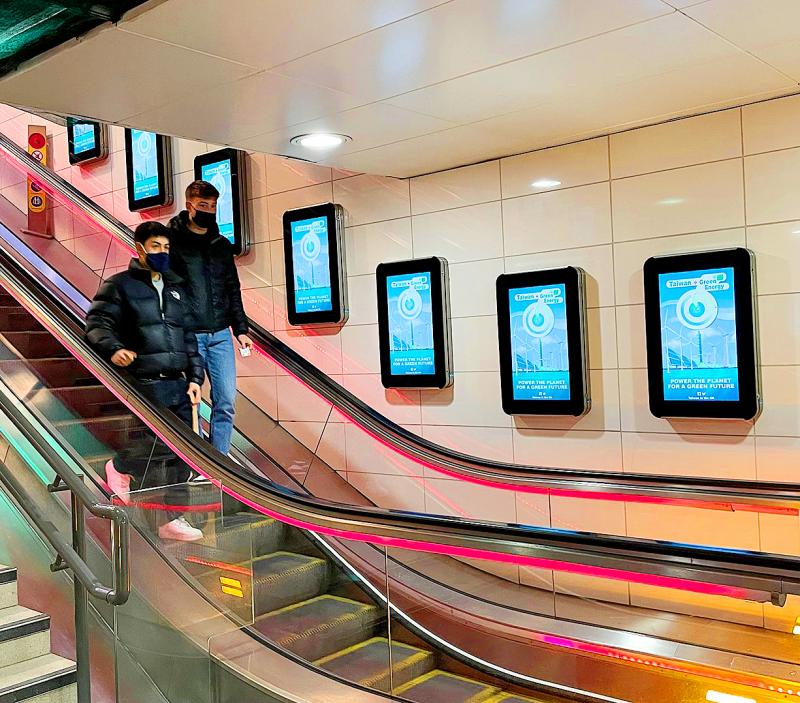As the world’s powers wrestle over the future of the planet in Glasgow, Scotland, another politically fractious issue is playing out on the sidelines of the COP26 climate summit — Taiwan’s exclusion from international organizations.
Two weeks after US Secretary of State Antony Blinken called for Taiwan to be allowed to play a greater role at the UN, a delegation from Taipei, led by Environmental Protection Administration (EPA) Deputy Minister Shen Chih-hsiu (沈志修), is set to test whether countries are willing to engage with them on the sidelines of the summit.
Shen pointed to the changing atmosphere in the US and Europe’s relations with China, saying that there is an increasing likelihood that Taiwan would be allowed to attend future UN climate summits — as an observer.

Photo courtesy of the Taipei Representative Office in the UK via CNA
“The climate convention emphasizes that every country should shoulder responsibility” for cutting emissions, Shen said in a telephone interview from Glasgow on Friday. “If any country is left out, it’s incomplete.”
“This isn’t fair to Taiwan, which is willing to shoulder the responsibility,” he said.
The climate conference runs until Friday.
Taiwan is not a member of the UN and is therefore unable to join other states at the summit.
Instead, Shen and his team are planning to hold events and meetings on the sidelines, as they are seeking to highlight what the nation is doing to combat climate change and engage with attendees.
Blinken’s comments were the latest US appeal for Taiwan to have “meaningful participation” in the UN system, such as the WHO and the International Civil Aviation Organization.
Taiwan had previously sent delegations to global climate summits, where it was listed as a non-governmental organization under the name of the Taipei-based Industrial Technology Research Institute.
There are no plans to strongly protest Taiwan’s exclusion in Glasgow, Shen said.
“We want to be contributors, not troublemakers,” he said.
While Taiwan is unable to sign the UN Framework Convention on Climate Change, President Tsai Ing-wen (蔡英文) announced that the government is exploring ways to reach the Paris agreement goal of net-zero carbon emissions by 2050.
Last month, the EPA proposed revisions to enshrine the goal into law.
Taiwan’s technology manufacturers, often at the behest of their international customers, have taken a leading role in pushing the nation’s industries to adopt more environmentally friendly methods.
Taiwan Semiconductor Manufacturing Co (TSMC), the world’s largest contract chipmaker, became the first company in its industry to sign up to the RE100 renewable energy initiative last year, pledging to use 100 percent renewable energy and producing no indirect carbon emissions from electricity consumption by 2050.
Demand for clean energy from TSMC and other major Taiwanese companies is likely to surge over the coming years, driving a rapid expansion in capacity.
The chipmaker consumed 16,900 gigawatt-hours (GWh) of energy last year, TSMC’s corporate social responsibility report said, while Taiwan as a whole only generated 15,000GWh in green energy.
The energy deficit is only likely to get worse, as TSMC’s electricity consumption is likely to at least double by 2024, Bloomberg Intelligence technology analyst Charles Shum has said in a report.

Taiwan is stepping up plans to create self-sufficient supply chains for combat drones and increase foreign orders from the US to counter China’s numerical superiority, a defense official said on Saturday. Commenting on condition of anonymity, the official said the nation’s armed forces are in agreement with US Admiral Samuel Paparo’s assessment that Taiwan’s military must be prepared to turn the nation’s waters into a “hellscape” for the Chinese People’s Liberation Army (PLA). Paparo, the commander of the US Indo-Pacific Command, reiterated the concept during a Congressional hearing in Washington on Wednesday. He first coined the term in a security conference last

Prosecutors today declined to say who was questioned regarding alleged forgery on petitions to recall Democratic Progressive Party (DPP) legislators, after Chinese-language media earlier reported that members of the Chinese Nationalist Party (KMT) Youth League were brought in for questioning. The Ministry of Justice Investigation Bureau confirmed that two people had been questioned, but did not disclose any further information about the ongoing investigation. KMT Youth League members Lee Hsiao-liang (李孝亮) and Liu Szu-yin (劉思吟) — who are leading the effort to recall DPP caucus chief executive Rosalia Wu (吳思瑤) and Legislator Wu Pei-yi (吳沛憶) — both posted on Facebook saying: “I

The Ministry of Economic Affairs has fined Taobao NT$1.2 million (US$36,912) for advertisements that exceed its approved business scope, requiring the Chinese e-commerce platform to make corrections in the first half of this year or its license may be revoked. Lawmakers have called for stricter enforcement of Chinese e-commerce platforms and measures to prevent China from laundering its goods through Taiwan in response to US President Donald Trump’s heavy tariffs on China. The Legislative Yuan’s Finance Committee met today to discuss policies to prevent China from dumping goods in Taiwan, inviting government agencies to report. Democratic Progressive Party Legislator Kuo Kuo-wen (郭國文) said

The Ministry of Economic Affairs has fined Taobao NT$1.2 million (US$36,900) for advertisements that exceeded its approved business scope and ordered the Chinese e-commerce platform to make corrections in the first half of this year or its license would be revoked. Lawmakers have called for stricter supervision of Chinese e-commerce platforms and more stringent measures to prevent China from laundering its goods through Taiwan as US President Donald Trump’s administration cracks down on origin laundering. The legislature’s Finance Committee yesterday met to discuss policies to prevent China from dumping goods in Taiwan, inviting government agencies to report on the matter. Democratic Progressive Party